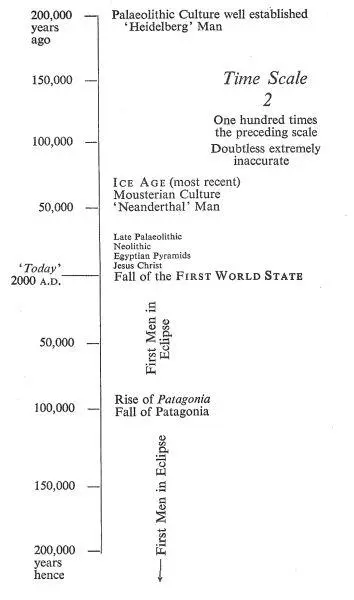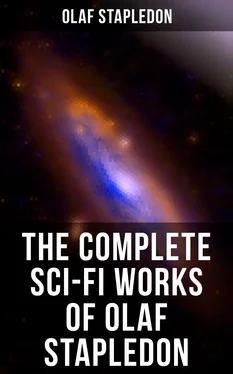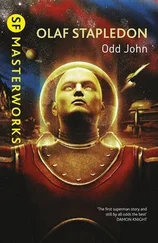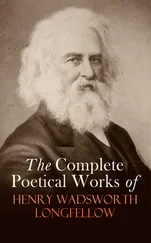
Inwardly the Second Men differed from the earlier species in that they had shed most of those primitive relics which had hampered the First Men more than was realized. Not only were they free of appendix, tonsils, and other useless excrescences, but also their whole structure was more firmly knit into unity. Their chemical organization was such that their tissues were kept in better repair. Their teeth, though proportionately small and few, were almost completely immune from caries. Such was their glandular equipment that puberty did not begin till twenty; and not till they were fifty did they reach maturity. At about one hundred and ninety their powers began to fail, and after a few years of contemplative retirement they almost invariably died before true senility could begin. It was as though, when a man’s work was finished, and he had meditated in peace upon his whole career, there were nothing further to hold his attention and prevent him from falling asleep. Mothers carried the foetus for three years, suckled the infant for five years, and were sterile during this period and for another seven years. Their climacteric was reached at about a hundred and sixty. Architecturally massive like their mates, they would have seemed to the First Men very formidable titanesses; but even those early half-human beings would have admired the women of the second species both for their superb vitality and for their brilliantly human expression.
In temperament the Second Men were curiously different from the earlier species. The same factors were present, but in different proportions, and in far greater subordination to the considered will of the individual. Sexual vigour had returned. But sexual interest was strangely altered. Around the ancient core of delight in physical and mental contact with the opposite sex there now appeared a kind of innately sublimated, and no less poignant, appreciation of the unique physical and mental forms of all kinds of live things. It is difficult for less ample natures to imagine this expansion of the innate sexual interest; for to them it is not apparent that the lusty admiration which at first directs itself solely on the opposite sex is the appropriate attitude to all the beauties of flesh and spirit in beast and bird and plant. Parental interest also was strong in the new species, but it too was universalized. It had become a strong innate interest in, and a devotion to, all beings that were conceived as in need of help. In the earlier species this passionate spontaneous altruism occurred only in exceptional persons. In the new species, however, all normal men and women experienced altruism as a passion. And yet at the same time primitive parenthood had become tempered to a less possessive and more objective love, which among the First Men was less common than they themselves were pleased to believe. Assertiveness had also greatly changed. Formerly very much of a man’s energy had been devoted to the assertion of himself as a private individual over against other individuals; and very much of his generosity had been at bottom selfish. But in the Second Men this competitive self-assertion, this championship of the most intimately known animal against all others, was greatly tempered. Formerly the major enterprises of society would never have been carried through had they not been able to annex to themselves the egoism of their champions. But in the Second Men the parts were reversed. Few individuals could ever trouble to exert themselves to the last ounce for merely private ends, save when those ends borrowed interest or import from some public enterprise. It was only his vision of a world-wide community of persons, and of his own function therein, that could rouse the fighting spirit in a man. Thus it was inwardly, rather than in outward physical characters, that the Second Men differed from the First. And in nothing did they differ more than in their native aptitude for cosmopolitanism. They had their tribes and nations. War was not quite unknown amongst them. But even in primitive times a man’s most serious loyalty was directed toward the race as a whole; and wars were so hampered by impulses of kindliness towards the enemy that they were apt to degenerate into rather violent athletic contests, leading to an orgy of fraternization.
It would not be true to say that the strongest interest of these beings was social. They were never prone to exalt the abstraction called the state, or the nation, or even the world-commonwealth. For their most characteristic factor was not mere gregariousness but something novel, namely an innate interest in personality, both in the actual diversity of persons and in the ideal of personal development. They had a remarkable power of vividly intuiting their fellows as unique persons with special needs. Individuals of the earlier species had suffered from an almost insurmountable spiritual isolation from one another. Not even lovers, and scarcely even the geniuses with special insight into personality, ever had anything like accurate vision of one another. But the Second Men, more intensely and accurately self-conscious, were also more intensely and accurately conscious of one another. This they achieved by no unique faculty, but solely by a more ready interest in each other, a finer insight, and a more active imagination.
They had also a remarkable innate interest in the higher kinds of mental activity, or rather in the subtle objects of these activities. Even children were instinctively inclined towards a genuinely aesthetic interest in their world and their own behaviour, and also towards scientific inquiry and generalization. Small boys, for instance, would delight in collecting not merely such things as eggs or crystals, but mathematical formulae expressive of the different shapes of eggs and crystals, or of the innumerable rhythms of shells, fronds, leaflets, grass-nodes. And there was a wealth of traditional fairy-stories whose appeal was grounded in philosophical puzzles. Little children delighted to hear how the poor things called Illusions were banished from the Country of the Real, how one-dimensional Mr Line woke up in a two-dimensional world, and how a brave young tune slew cacophonous beasts and won a melodious bride in that strange country where the landscape is all of sound and all living things are music. The First Men had attained to interest in science, mathematics, philosophy, only after arduous schooling, but in the Second Men there was a natural propensity for these activities, no less vigorous than the primitive instincts. Not, of course, that they were absolved from learning; but they had the same zest and facility in these matters as their predecessors had enjoyed only in humbler spheres.
In the earlier species, indeed, the nervous system had maintained only a very precarious unity, and was all too liable to derangement by the rebellion of one of its subordinate parts. But in the second species the highest centres maintained an almost absolute harmony among the lower. Thus the moral conflict between momentary impulse and considered will, and again between private and public interest, played a very subordinate part among the Second Men.
In actual cognitive powers, also, this favoured species far outstripped its predecessor. For instance, vision had greatly developed. The Second Men distinguished in the spectrum a new primary colour between green and blue; and beyond blue they saw, not a reddish blue, but again a new primary colour, which faded with increasing ruddiness far into the old ultra-violet. These two new primary colours were complementary to one another. At the other end of the spectrum they saw the infra-red as a peculiar purple. Further, owing to the very great size of their retinae, and the multiplication of rods and cones, they discriminated much smaller fractions of their field of vision.
Читать дальше













